Dive Brief:
-
Target on Monday said it has hired two new senior food and beverage executives — set to start later this month — to accelerate its food and beverage strategy, which includes an emphasis on fresh produce, convenient eating and a curated assortment of affordable and accessible private-label and national brands, according to a company press release.
-
Mark Kenny has been named to a divisional vice president role of meat and fresh prepared food, where he will oversee the meat, seafood, deli, bakery and prepared food categories. He comes from Walmart, where he most recently was the senior director of private brands, deli and bakery, and will report to Jeff Burt, senior vice president of food and beverage.
-
Liz Nordlie, who was most recently the president of the baking division at General Mills, has been named vice president of product design and development for food and beverage at Target. She will oversee the brand direction and product vision for Target’s private label food and beverage effort, according to the press release. Nordlie brings 27 years of brand-building experience across 30 food and beverage businesses, including two decades in general management roles, building brands across cereal, snacks, meals, yogurt and baking core businesses. She’ll report to Julie Guggemos, senior vice president of product design and development.
Dive Insight:
Although Target has been hit with criticism for its lackluster grocery offering, CEO Brian Cornell has reiterated that the big-box retailer has no ambitions to serve as a traditional grocery retailer. Several analysts have questioned that, noting that grocery is a major driver of store traffic for retailers like Walmart. "Target continues to be plagued by a rather bland foray into grocery," Joleen Wroten, senior retail strategist at retail intelligence firm 360pi, told Retail Dive in an email earlier this year. "Target reportedly earns one-fifth of their sales from grocery categories whereas Walmart generates over 50% of their sales from grocery in the U.S."
It’s possible that Target is purposefully attempting to stay above the fray, considering the expanding competition from no-frills German grocery chains Aldi and Lidl that threaten to disrupt the grocery business and decimate the already thin margins of that category. In any case, Target's Cornell has declared the company has no intentions of morphing into a traditional grocery store, but new stores and formats will reveal how it plans to better merchandise grocery in critical urban markets.
Target has emphasized merchandise differentiation to compete on more than prices, and its grocery effort, bolstered by the addition of two executives in part tasked with amping up private label offerings, seems poised to follow that strategy, as well. And it should, she said. "Grocery is an exceptionally challenging space to compete in thanks to Walmart's aggressive pricing, new and expanding threats (ie. Fresh Thyme, Whole Foods and Hy-Vee's new format) and general market food deflation impacting everyone," Wroten said. "Additionally, recent reports indicate that Walmart has gone back to their manufacturers looking for even deeper cost cuts to support a push to further lower prices. This effort appears to be aimed at the likes of global discount supermarket chain Aldi and not players like Target, but embattling Walmart in a pricing war is undoubtedly a losing battle for Target. The retailer should return to their legacy ability to differentiate with exclusive, affordable 'fresh' product offerings coupled with clean and easy shopper experiences."
Amazon, whose own grocery efforts have met with challenges, is making Target's tricky grocery situation even trickier. There’s already evidence that Amazon Prime members in particular use the site to "solve their problem" if their favorite consumer product can’t be found at Target, Walmart or their usual grocery store, according to research from consulting firm Frank N. Magid Associates. As consumers shift away from brick and mortar towards e-commerce for consumables, the popularity of Amazon's services such as Prime, Pantry and Fresh are gaining ground, according to One Click Retail.
And Amazon is likely to only get stronger with its acquisition of Whole Foods. "We also think Target is more vulnerable to Amazon’s planned purchase of Whole Foods than Walmart, given what we believe is significantly greater overlap in customer demographics with both Amazon Prime and Whole Foods," MKM analyst Patrick McKeever wrote in a note cited by MarketWatch Monday.















